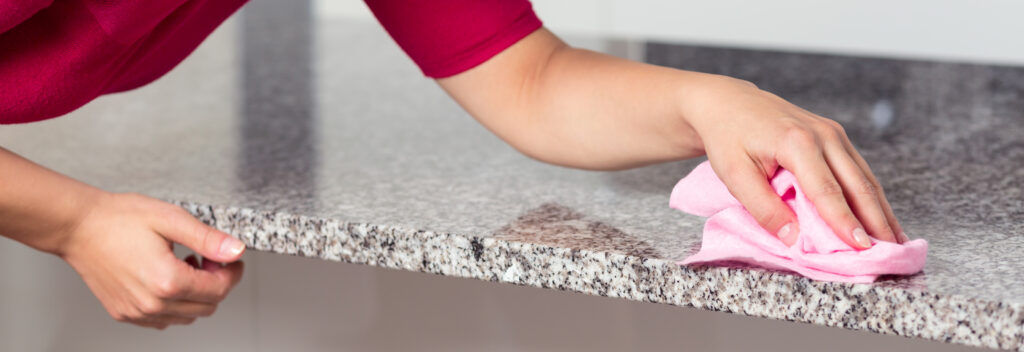Your Total Guide on How to Clean Granite Countertops in Home Kitchens
Knowing how to clean granite countertops is the most important thing you can do to keep them in like-new condition. Granite is one of the strongest types of stone for kitchen and bathroom counters, but it can wear over time. And, the wear and tear on granite are exponentially more if you accidentally clean it with the wrong products.
But, once you know how to clean granite, it is easy to keep it in tip-top condition for years to come. Learn everything you need to know about which products and techniques are best for cleaning granite. And, find out what to do when your stone countertop loses its luster.
How to Clean Granite Countertops: The Total Guide – 2021
Granite is a very strong and long-lasting material, but if you don’t know how to clean granite countertops, they can easily be damaged. Abrasive techniques and strong chemical products have a detrimental effect on the longevity of the stone. And, proper cleaning of the stone maintains its productivity in your kitchen for years to come.

In this guide, you learn how to maintain the aesthetic beauty and usefulness of your granite countertops. Learn how easy it is to clean granite with simple products you have in your home. Here are your step-by-step cleaning instructions for granite in your kitchen:
Clean the Stones Surface with Dish Soap and a Sponge
Granite is an absorbent stone, and when it retains moisture it expands like a sponge. So, you want to keep your countertops from retaining water or cleaning products. Granite countertops are manufactured with a sealant layer on the surface of the stone, which gets worn away from the abrasive action of dust and dirt.
When dust and dirt build up on the surface of the countertop, it acts like sandpaper and scrapes away at the stone sealant layer. The best way to keep your countertops losing their water-resistant layer is to keep them clean of dust and dirt build-up. Regularly clean your countertops with common dish soap, on a soft non-abrasive sponge.
Run warm tap water over the sponge until it is soaking wet. Place a dollop of soap on the sponge about the size of a pea and work it into the sponge until the soap creates small suds and bubbles. Before using it on your countertops – wring out the excess water from the sponge as not to leave excess water on the surface of your counters.
Sanitize the Countertop with Rubbing Alcohol
After scrubbing down the surface of the granite, use a soft dry sponge or cloth to soak up the excess moisture from the surface of the countertop. If you want to further sanitize the surface of your countertop, use between 70% and 100% isopropyl rubbing alcohol. Use a misting spray of alcohol across the surface of the granite, let the alcohol sit for 10 seconds, then wipe it off with a soft and dry cloth.
Use Baking Soda and Hydrogen Peroxide on Stains and Grime
No matter how often you clean and sanitize, granite can retain water stains and accumulate grime that is tough to get rid of. For these stains and tough spots, use hydrogen peroxide, baking soda, water, and dish soap. If you encounter grime that you can’t scrub off, try mixing baking soda, warm water, and dish soap in a bowl.
Using a soft sponge, scrub the mixture on the stain or grime. The baking soda acts as an abrasive to get the grime – but it doesn’t hurt the granite sealant. For water stains, use baking soda and a teaspoon or two of hydrogen peroxide. If the stain is particularly stubborn, use a spoon to scoop your cleaning mixture onto the treatment area, cover it with plastic wrap and seal the edges with scotch tape.
Leave the mixture to work on the stain overnight, or for about 8 to 12 hours. Then, remove the plastic wrap and use a wet sponge to scrub away the stain. After using the baking soda solution, be sure to thoroughly clean the surface of any excess cleaning products and dry with a soft cloth.
How Do Granite Countertops Get Damaged?
Granite counters get damaged when the wrong materials are used to clean them, such as abrasive sponges or steel wool. The most common pitfall in cleaning granite is using acidic solutions, ammonia, or bleach. Steer clear of vinegar and ammonia-based cleaning products, such as Windex cleaner – as well as bleach or chlorine.
These products dull the shiny surface of the granite, which equates to degradation of the surface sealant. And, once the sealant on the surface of the granite is worn through, you have to either replace the countertop or re-seal the granite. Talk to a Myers Countertops associate for a free consultation on getting new countertops for your kitchen, resealing your existing stone counter, or further information on how to clean granite countertops.